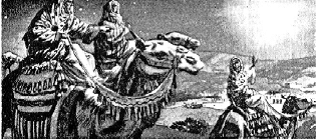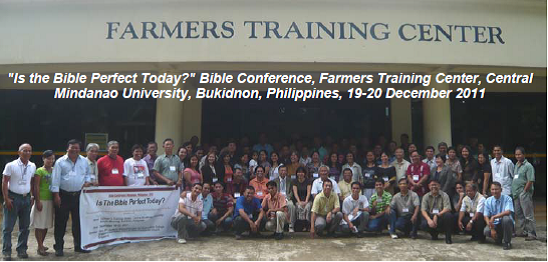Christmas 2000 Years Ago (II)

Visit of the Wise Men
“Now when Jesus was born in Bethlehem of Judaea in the days of Herod the king, behold, there came wise men from the east to Jerusalem, Saying, Where is he that is born King of the Jews? for we have seen his star in the east, and are come to worship him.” (Matt 2:1, 2).
Who were these wise men? These “wise men” called “magi” in the original were probably Persian priests who were skilled in the study of the stars (cf Dan 1:20). The text tells us that they came from the East, possibly from Persia. If they were indeed from Persia, how did they come to know about the “King of the Jews” (Matt 2:2)? It is possible that the Jews while in exile in Babylon preached to the Persians the coming of their Messiah. It is difficult to see how the wise men could have come to a conclusion simply from astronomy that a great Jewish King was going to be born. This Messianic notion of theirs probably stemmed not just from their knowledge of the stars but more so their knowledge of OT prophecy, perhaps, Daniel’s (Dan 9:24-26 cf Num 24:17, Matt 2:16). The supernatural appearance of an extraordinary star led them to conclude that the time had arrived, the Holy Spirit guiding them in their determination of the timing of both prophecy and phenomenon.
Herod the Great demanded to know exactly where Christ would be born. The Jewish clerics on the basis of Micah 5:2 rightly answered, “in Bethlehem of Judea” (there was another Bethlehem in Galilee). After receiving instructions from Herod, the wise men set off to find the infant King. Note that they found Him in a house. Jesus was no longer in the stable. Evidently, the wise men did not arrive on his birthday, but shortly after that. Some time must have passed, and Joseph and Mary must have found proper accommodation by then. Jesus was also described as a “young child,” perhaps about two months old (nb:Jesus was born in 5 BC and Herod died in 4 BC; cf Luke 2:22, Matt 2:19-20).
When the wise men found Jesus, they rejoiced greatly at the sight, and prostrated themselves to worship Him, and presented to Him royal and priestly gifts of gold, frankincense and myrrh. And after being warned by God not to report to Herod, they obediently returned to their home country via another route.
Escape to Egypt
“And when they [the wise men] were departed, [and after] they [Joseph and Mary] had performed all things according to the law of the Lord, behold, the angel of the Lord appeareth to Joseph in a dream, saying, Arise, and take the young child and his mother, and flee into Egypt, and be thou there until I bring thee word: for Herod will seek the young child to destroy him. When he arose, he took the young child and his mother by night, and departed into Egypt: and was there until the death of Herod: that it might be fulfilled which was spoken of the Lord by the prophet, saying, Out of Egypt have I called my son. Then Herod, when he saw that he was mocked of the wise men, was exceeding wroth, and sent forth, and slew all the children that were in Bethlehem, and in all the coasts thereof, from two years old and under, according to the time which he had diligently enquired of the wise men. Then was fulfilled that which was spoken by Jeremy the prophet, saying, In Rama was there a voice heard, lamentation, and weeping, and great mourning, Rachel weeping for her children, and would not be comforted, because they are not.” (Matt 2:13-18, Luke 2:39).
Herod was intent on killing the infant King. Joseph was instructed by the Lord’s angel to take little Jesus and Mary to Egypt for safety. Luke tells us that by this time, Joseph and Mary had already performed all the ceremonial duties required of them in the Mosaic Law. God left nothing unturned. Jesus indeed had to fulfil every tiny bit of the Law even as a baby through His earthly parents (cf Matt 5:17-18). Luke which emphasises Jesus’ perfect humanity as man’s Perfect Representative is teaching here the active obedience of Christ.
It is paradoxical and ironical that Jesus should flee to Egypt—the place from which God through Moses led His people out. God rescued His people out of Egypt—a land of bondage and slavery, into Israel—the promised land of milk and honey. The land of Israel should be the safest place for the infant Messiah—the land He Himself had given to His people; yet it had become a land most dangerous, and now Egypt a country most safe! It is no wonder John indicted His fellow-countrymen in the very first chapter of his gospel: “He came unto his own, and his own received him not” (John 1:11).
In light of this, some may ask, “Did Jesus come at the right time?” Indeed, He did. As Paul wrote He came in “the fulness of time” (Gal 4:4). He came at a time when the Israelites and the world needed Him most; a time when the unbelief of Israel and the wickedness of the world were at their height: “He was in the world, and the world was made by him, and the world knew him not” (John 1:10). But “in him was life; and the life was the light of men. And the light shineth in darkness; and the darkness comprehended it not” (John 1:4-5). “But as many as received him, to them gave he power to become the sons of God, even to them that believe on his name” (John 1:12). The advent of Christ at such an evil time underscores the grace and mercy of God. Is there in this world a king that would seek such a humbling and humiliating entrance? We can be quite sure there is none but Jesus.
In going to Egypt, Jesus fulfilled a typologically Messianic prophecy in Hosea 11:1, “When Israel was a child, then I loved him, and called my son out of Egypt.” Note that Matthew quoted only the second part of the verse. The first part clearly had to do with Israel—a nation beloved of God. Israel as such became a type of Christ. Just as God had saved Israel by calling her out of Egypt, so God will save His Church through His beloved Son whom He is calling out of Egypt.
Herod the Great massacred “all the children that were in Bethlehem, and in all the coasts thereof, from two years old and under” (Matt 2:16), hoping that perchance, the baby Jesus would be among them. Imagine the grief and pain this infanticide must have caused. Matthew in verse 17 said that this fulfilled the words of Jeremiah, “Thus saith the LORD; A voice was heard in Ramah, lamentation, and bitter weeping; Rachel weeping for her children refused to be comforted for her children, because they were not” (Jer 31:15). On the fulfilment of this prophecy, Calvin insightfully commented,
The prediction of Jeremiah having been
accomplished at that time, Matthew does
not mean that it foretold what Herod
would do, but that the coming of Christ
occasioned a renewal of that mourning,
which had been experienced, many
centuries before, by the tribe of
Benjamin. … But as Jeremiah promises a
restoration, where a nation has been cut
off, down to their little children, so
Matthew reminds his readers, that this
massacre would not prevent Christ from
appearing shortly afterwards as the
Redeemer of the whole nation: for we
know that the whole chapter in Jeremiah,
in which those words occur, is filled with
the most delightful consolations.
It is unlikely that Jesus’ stay in Egypt lasted for more than a year for Herod died in 4 BC. His evil intent and cruel act no doubt called for God’s swift judgement. He died of a terrible disease. Herod was succeeded by his worst son Archelaus (cf Matt 2:22).
Return to Nazareth
“But when Herod was dead, behold, an angel of the Lord appeareth in a dream to Joseph in Egypt, saying, Arise, and take the young child and his mother, and go into the land of Israel: for they are dead which sought the young child’s life. And he arose, and took the young child and his mother, and came into the land of Israel. But when he heard that Archelaus did reign in Judaea in the room of his father Herod, he was afraid to go thither: notwithstanding, being warned of God in a dream, he turned aside into the parts of Galilee: and he came and dwelt in their own city called Nazareth: that it might be fulfilled which was spoken by the prophets, He shall be called a Nazarene.” (Matt 2:19-23, Luke 2:39).
After Herod died, the angel of the Lord told Joseph to return to Palestine. Judea would not be a wise choice to live since Archelaus was no better a king than Herod, and equally wicked and threatening. The angel led Joseph to Galilee, and in obedience he resided in Nazareth fulfilling Old Testament prophecies that the Messiah would be a Nazarene (Isa 11:1, Jer 23:5, 33:15, Zech 6:12). JK
Bible Conference @ Central Mindanao University
“Is the Bible Perfect Today?” was the question I sought to answer in a Bible Conference held at the Farmers Training Center, Central Mindanao University (CMU), Bukidnon, 19-20 December 2011. I thank the Lord for the opportunity to deliver four lectures on the inspiration, preservation, and translation of the Bible (plus a Q&A session) to more than 70 Baptist pastors, mostly Bible Baptists and Fundamental Baptists, who came from different parts of Mindanao. A two-hour documentary on “The Indestructible Book” produced by Cambridge University was also shown. Praise the Lord for a very successful conference.
The organisers of this Bible conference were Dr Jose Lagapa and Dr Einstine Opiso, both PhDs from Hokkaido University, who were wonderfully saved under the gospel ministry of Dr Robert Kluttz, veteran missionary to Japan and pastor of the Hokkaido Bible Centre in Sapporo. Dr Lagapa who has answered God’s call to full-time ministry is a final-year MDiv student at FEBC and Dr Einstine is Professor of Engineering at CMU. Dn Jonas Ba’a (Dr Lagapa’s brother-in-law) and Mdm Pat Solidum did much to promote and support the conference. The Lord bless them for their faith and for their labour of love.
After the conference, Jemima and I had a couple of days of R&R in Davao City and Samal Island before flying home on Thursday 22nd, a 3½-hour direct flight on Tiger Airways. Praise God for a profitable trip, and thank you all for your prayers. Dr Lagapa will be writing a full report of the Lord’s blessings at the Bible conference. JK



